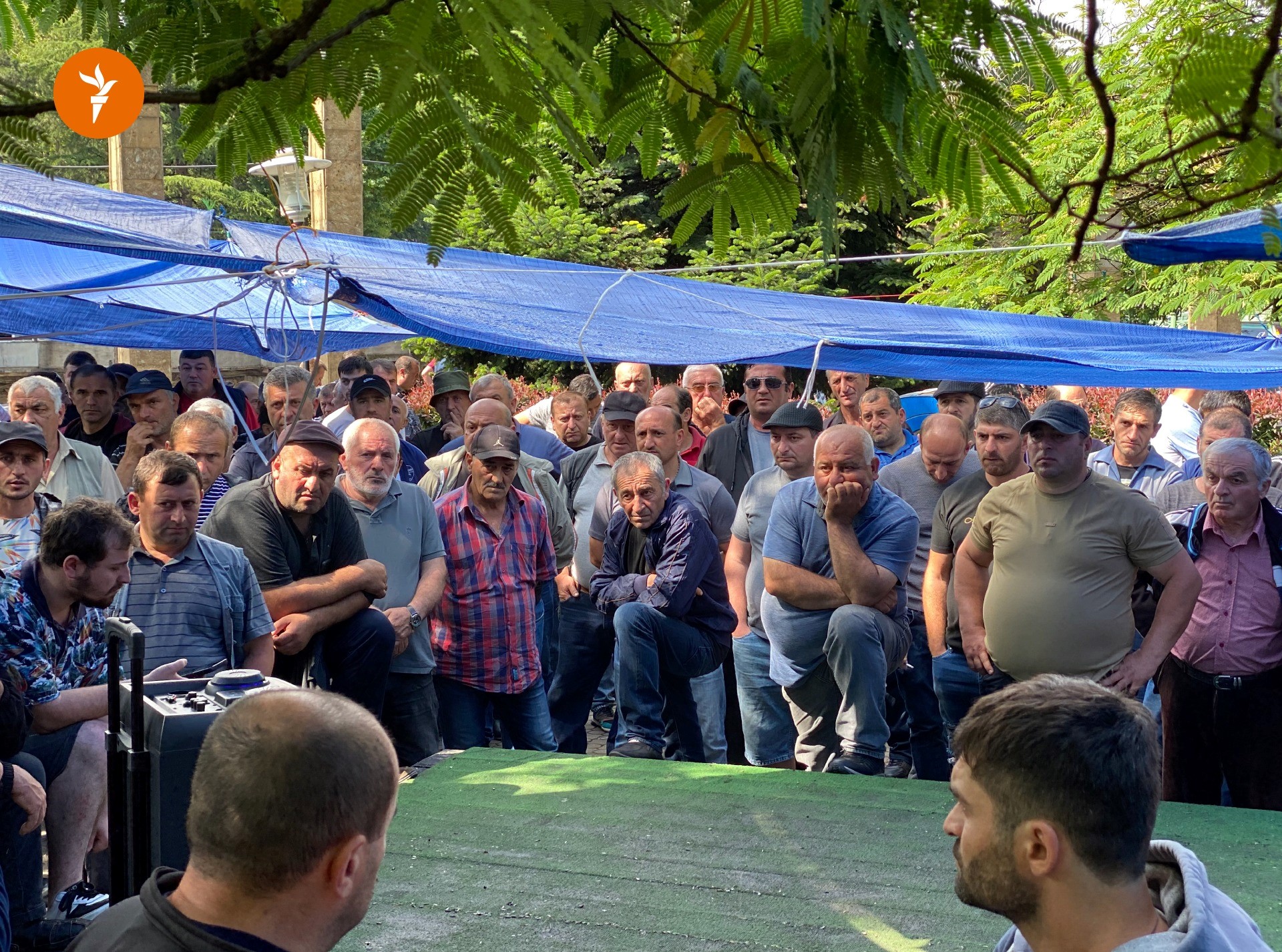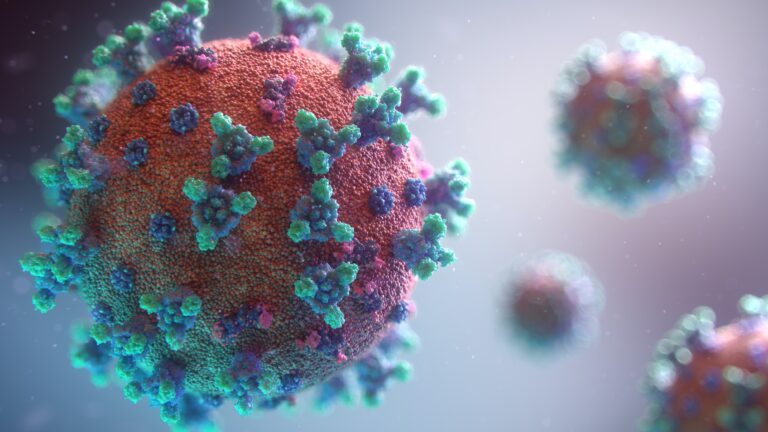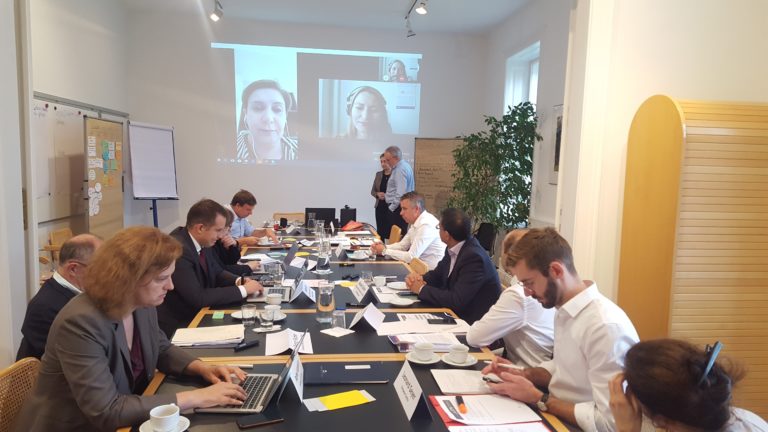Georgian Miners are on strike – AGAIN
By Dea Bakashvili, Program Associate/ Intern at Civic IDEA
Picture: Tornike Mandaria, Journalist at Radio Tavisupleba
The Georgian Manganese Holding is the Georgian subsidiary of the British company Stemcor, producing manganese and ferroalloys. The GM owns JSC Ferro in Zestafoni and Chiaturmanganumi in Chiatura and is a leading producer. Georgian Manganese has been one of the country’s top employers for many years and very well known for protests regarding their work.
Chiatura is one of the first industrial cities in Georgia. As the only area for extracting manganese, it is significant with its importance for the economy of the country. In various periods manganese was exported and processed by private enterprises or by the state. In the city territory, there are lots of unused tunnels, goods cableways, ore enrichment plants etc. Moreover, the first passenger cableway in the Soviet Union was in Chiatura (1953), which much earlier was used for industrial purposes. Along with its industrial heritage, the city is also famous for an aerial cableway network attracting foreign visitors to the town.
Chiatura faces a serious impediment to real self-government because in 2006 it was included in the mining allotment of the license issued to the company in 2006, under which the license holder is authorized to make decisions on issues related to spatial development or any other issue of the city. Another main challenge are shortages in professional resources, which are associated with high levels of emigration and unemployment. Lack of collaboration of civil society and positive engagement experience are also connected to the limited financial and human resources of self-government and financial institutions.
Protest demonstrations have been arising from time to time demanding both miners’ labor and social rights, such as: improving safety guarantees, enhancing working conditions and providing equitable wages. Currently, on June 14, 2023, in the western mining city 3,000 miners went on strike demanding increase in wages, improvements in safety conditions, better insurance, and nutrition, 12-hour shifts, vacations, technology upgrades and curbing of pollution caused by the extraction. The recent crisis in the ferroalloys market, which the company points to, cannot justify the fact that for years Chiaturians have not been distributed the benefits from the resources in their cities and villages, and despite the severe environmental and labor violations committed during the utilization of this resource, the company remains untouched.
The manganese industry plays an essential role in the economy of the city, which is the major employer of the local population. Manganese extracted in Chiatura is 10% of exporting material of Georgia. The city remains one of the most vital centers of manganese extraction and processing in the South Caucasus. However, there are no other alternatives for employment and economic development in Chiatura. A special emphasis should be placed on the catastrophic ecological situation created in Chiatura and the frequent pollution cases of environmental damage in the city and neighboring villages. The pollution has had the worst impact on the workers and their families. Hence, systemic injustice and social despair have forced the miners to resort to extreme forms of protest.
Since 1 February 2023, the company “Georgian Manganese” has implemented a “temporary working mode”, which involved the closure of several mines and shafts, resulting in workers receiving 60% of their wages. The company justified all by pointing to the global crisis in the world market. These temporary arrangements have caused difficulties for the miners in meeting their financial obligations. In addition, the company proposed a new plan for determining employee performance which involves shifting the measures. The company used to calculate the salaries based on the mass of ore extracted, but according to the new conditions, the distance travelled within the mine will count. The miners claim that this new form of estimating their work would require compromising health and safety standards, putting their lives at risk and will result in a loss of 15% of salary.
The lack of appropriate equipment, protective clothing, and the many safety risks have been reported by strikers working in the mines. Mostly they are obliged to carry heavy equipment weighing 120-130kg, mainly relying on just two people. Some mines consist of puddles from which special shoes cannot protect them and the water pump is of poor quality. Moreover, mining pressure levels are not controlled in mines. The tractors and the water system are faulty and emit emissions. The dust concentration is not measured after the explosions, the ventilation system is not working properly, the safe distance from the explosion is not pointed, etc.
In addition to safety issues, miners also feared that it would be difficult to fulfill the daily work plan under the new, more demanding system that has been put in place by the company, leaving them without full payment as well as the bonuses and benefits they relied on previously. The strikers’ demands for change is related to these circumstances.
Apart from the one-day strike, some of the miners have continued their protests in front of the Parliament building and are being supported by human rights non-governmental organizations, who are actively involved in the process. At the individual level, at least 10 miners went on hunger strike, with two of them sewing their mouths and eyes shut in protest, over the past several days, following unsuccessful negotiations with the company.
The terms offered by the company to the employees regarding to their demands are:
Return to the old 12-hour working schedule –which included working 7 days with a 12-hour schedule (2 shifts per day and night) and resting for the next 7 days. Such a regime was additionally giving miners a chance to take another temporal job and raise their financial status. The new schedule involves a transition to a three-shift system per day and, accordingly, an 8-hour work schedule. Employees will have to work more days during the month.
Salary increases by 5% – It is known that the workers demanded a 40% increase in wages, but instead they received an offer of a 5% increase. According to the collective agreement signed between the employer and the trade unions, a 5% salary increase should have happened automatically at the beginning of 2023 but was not fulfilled by the company. In addition, in the case of inflation of more than 5%, the issue of salary increase should have been negotiated but that also did not happen.
Accommodation and food – Near the workplace, miners were able to use accommodation which was especially convenient for employees from other municipalities who had been systematically staying during the working week. As for this year, the residence no longer serves miners. They also had 2 meals per day and according to the strikers, the quality and quantity of food was humiliating.
Conducting Audit – Miners had some doubts regarding corruption in the company and for that reason were claiming to conduct audit for examining financial reports.
While most of the miners’ 14 demands were about the provision, enforcement, and protection of basic labor rights, the Georgian Manganese Holding made a statement and said that they are prepared to transfer the management of the Chiatura mines to the miners, on the condition that the employees take responsibility and achieve a comprehensive consensus. In addition, they publicly posted the amount of each protester’s salary by month.
The statement reads: “For the Company, the protection of the health and safety of its employees is our main value. Based on the above, the Company responds to the demand, expressed many times during the current rallies, to hand over the Chiatura mines to the miners”.
The abovementioned statement exposes the real intention of the company. It is obvious that the miners will not be able to properly rule the company without outstanding effort and support. Instead of saying they will transfer the responsibilities to the workers themselves, they should provide better working conditions, pay appropriate wages and protect minors against safety risks. The company’s response seems more of a manipulation of public opinion than a real effort to respond to the workers’ demands. Moreover, exposing the numbers publicly is another violation of workers’ rights and personal data protection. With this step of demonstrating power, the company has further narrowed the possibility of consensus.
However, a lot of citizens have been supporting miners by standing on their side on strikes and things have been rapidly changing. The Public Defender of Georgia, Levan Ioseliani, met with the striking miners of Chiatura on June 15 to listen to their concerns. Protesters asked for the Public Defenders assistance in mediating. Moreover, protests have been allied by Georgian active CSOs that made a joint statement encouraging the inclusion of this issue on the political agenda.
At the end, with State mediation and trade unions involved, striking miners and “Georgian Manganese” reached an agreement on 24 June, ending the 19-day protest. The company committed to resume the mining operations in Chiatura. Georgian Manganese announced that a new agreement addresses all demands, including pay rise to the inflation rate, a crisis resolution plan (a commission will be formed involving workers and they will develop a plan within three months), and an independent auditor will be employed to conduct a financial audit to the company. The Georgian Trade Unions Confederation emphasized that if the inflation index (ranging from 1% to 5%) exceeds, further negotiations will be required.







